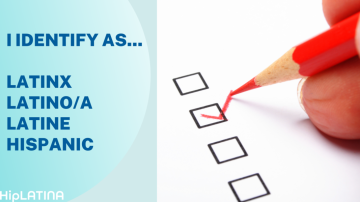Poll Finds Up to 40 Percent of Voters Are Offended by the Term “Latinx”
This month has brought in new fuel to add to the decades-long debate in the Latinx community: the name we use to identify ourselves

This month has brought in new fuel to add to the decades-long debate in the Latinx community: the name we use to identify ourselves. Do we use Latino or Latinx or Latine? Do we call it #LatinxHeritageMonth or #HispanicHeritageMonth? Chicana or Chicanx? This past November, a poll was conducted by Bendixen & Amandi International, a Miami-based consulting firm used by nonprofits and political campaigns, which found huge divides in the usage and perception of the word “Latinx” among a group of 800 Latinx voters in the U.S. While 57 percent of the participants surveyed in the poll aren’t offended by the term ‘Latinx‘ “up to 40 percent are saying that this term, either bothers or offends them,” the firm’s CEO Fernand Amandi said, according to NBC News.
“Latinx” first appeared as a term in 2004 when discussions surrounding the inherent gender binaries in Spanish were becoming more prevalent online and in academia. It didn’t quite take off until the wider American public became more aware and accepting of trans and nonbinary identities, especially in Indigenous communities, in 2016.
Since then, there have been many reasons we’ve adopted and embraced the -x suffix, including its link to the Indigenous Mexican language Nahuatl and its honoring of LGBTQIA+ folks who resist the masculine -o and feminine -a suffixes in Spanish.
But the popularity and usage of “Latinx” have been almost exclusively pushed by younger and progressive Latinx folks. In fact, the poll found that Democrats, even if they didn’t use “Latinx” to identify themselves, were less likely to be offended by the term. Which leaves older generations and conservative folks angry, offended, and confused, so much so that using “Latinx” could even drastically affect the amount of support they receive from Latinx voters.
“I think one has to be careful in saying, ‘this is the silver bullet reason for why Republicans are making inroads,” Amandi said. “But what I think the data makes clear is that this is not helping Democrats potentially maximize this critical voting bloc for that, and their electoral chances.”
Instead, “Hispanic” and “Latino” still remain the most popular identifiers among voters both U.S. and foreign-born, with “Latinx” only being used by 2 percent nationwide. While a significant part of it can be attributed to homophobia and lack of understanding towards the LGBTQIA+ community, it’s also a linguistic issue. Many native Spanish speakers have a difficult time pronouncing the term, which is why “Latine” has become more prevalent online and for many is more accommodating of the language.
The debate shows no signs of ending any time soon, especially because of how complicated it can become based on political ideologies, age, and birth origins. There’s much work to be done in unpacking the white supremacist ideals and intolerance associated with the term, and in asking if we even need a collective label at all. Because if nothing else, this controversy proves that we are not a monolith, despite us trying to choose a name that will paint us as one.

















